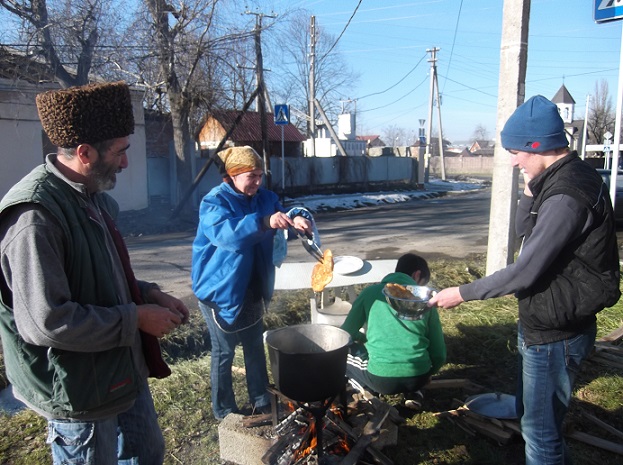
On Eve of Olympics, Circassians Hold First Ever Public Commemoration of 19th Century Tragedy
Publication: Eurasia Daily Monitor Volume: 11 Issue: 13
By:

On January 2 and 9, Adyge Khase—Circassian Council, a Circassian civil organization in Adygea—held its first public commemoration of the 150th anniversary of the final military defeat of Circassian forces by the Russian imperial army and the end of historical Circassia. The Circassian activists in the North Caucasus decided to declare 2014 a year of mourning. In a special mourning procedure, they fry flat cakes and distribute them among passers-by on Thursdays to remind them about the tragic events of the past. The family of Sergei Koblev, the head of the organization, organized the first ritual event, and other activists and ordinary Circassians are expected to follow suit. “By distributing fried cakes, we remind people about the war that lasted for more than a hundred years, about the genocide committed against our people, about our remembrance of the people killed,” Koblev said. The activist is writing the names of the Circassian villages destroyed by the Russian army on the bricks of his house and says that the wall will be filled up (https://www.natpress.ru/index.php?newsid=8633).
The Circassians’ commemoration of the Russian-Circassian war of the 19th century coincides with the 2014 Winter Olympic Games in Sochi. For many Circassians, the Olympics in Sochi symbolize the catastrophe the Circassians went through 150 years ago. Indeed, Russian forces dealt the final blow to the Circassian forces near today’s Sochi and paraded their forces at a place called Krasnaya Polyana. The vast majority of the Circassians were exterminated or deported to the Ottoman Empire, and ethnic Russians were quickly dispatched to settle in their land. It is estimated that currently only about 10 percent of the Circassians, or approximately 700,000 people, live in their historical home in the North Caucasus. The majority of the Circassian population is scattered across the Middle East, with the largest number of ethnic Circassians living in Turkey. Various Circassian groups have tried to use the Olympics in Sochi to attract the world community’s attention to their plight, as the Russian government has predictably disregarded the Circassian issue. The Circassians are not even presented as the only indigenous people of the region in the Olympics program. Instead, they are portrayed as only one of many, while Cossacks in Circassian folk dress will have the feature role in the Olympics opening ceremony.
The Sochi Olympics will be taking place against the backdrop of another situation that affects the Circassians—the civil war in Syria. Having been scattered across the Middle East after their expulsion from the Caucasus to the Ottoman Empire, approximately 100,000 Circassians today reside in Syria. After the civil war in Syria erupted, Circassians demanded that Moscow let the Syrian Circassians return to their historical homeland in the North Caucasus. The Russian government has been extremely reluctant to allow Syrian Circassians to return to the North Caucasus. Only about 1,000 Circassian refugees from Syria were temporarily allowed to enter the Russian Federation, and some of those were subsequently caught in a convoluted web of government visa requirements and absurd charges for claiming asylum in Russia after entering the country on non-resident visas. For example, when normal western countries accept someone as a refugee, they are not charged any fees. In the case of the Circassians asking Russia for asylum, they are charged a $1000 fee and then only allowed for 3-4 months and then must leave the country and repeat the whole process over again in a couple of months. The whole process appears to be a money-making venture for the Kremlin, aimed at preventing long-term repatriation.
Given Moscow’s disregard for the plight of the Circassians, some commentators raised fears that they might attack the Olympic sites in Sochi. In December, several prominent Circassian activists were detained for alleged collaboration with an obscure Islamic radical, but were quickly released (https://www.kavkaz-uzel.ru/articles/235109/). Following their detention, the activists released a statement distancing themselves from violent actions of any kind. They concluded their statement by declaring: “The Circassian national movement consistently and strictly adheres to secular principles and ideas of democracy, [and] strives solely for civilized solution[s] to all existing problems” (https://freecircassia.ucoz.com/news/declaration_of_circassian_activists_due_to_the_rise_of_terrorist_threats_in_the_caucasus/2014-01-16-363).
In contrast to the Circassians, the ethnic Abkhaz, who are closely related to the Circassians, have displayed a much warmer attitude toward Moscow. This discrepancy has even created some tensions between the Circassians and their ethnic brethren in Abkhazia. In the opinion of the Circassian activist Aslan Beshto, the Olympics were only part of the problem, with the Circassians ignoring the Games while the Abkhaz supported and embraced them. More importantly, according to Beshto, the Abkhaz antagonized the Circassians when the de-facto president of Abkhazia, Alexander Ankvab, refused to participate in the project to build a highway across the Caucasus Mountains that would connect Abkhazia to the Circassian territory in the North Caucasus (https://www.ekhokavkaza.com/content/article/25224241.html).
A highway from Abkhazia’s Kodori Gorge to Karachaevo-Cherkessia used to be called the Voenno-Sukhumskaya Doroga (Military-Sukhumi Road) but it was closed in the 1940s. The idea of rebuilding the highway has been hailed in Abkhazia and among Circassians in the North Caucasus for quite a long time. Ankvab’s sensational refusal to allow the highway to be built, on the grounds that it would damage Abkhazia ecologically, sparked significant debate in Abkhazia. Some commentators suggested that Ankvab was carrying out Moscow’s orders, as the latter did not want to give the North Caucasians access to Abkhazia and, potentially, to the Black Sea (https://www.regnum.ru/news/fd-south/analitics/1571324.html).
The Sochi Olympics have raised the national consciousness of the Circassians in the North Caucasus and worldwide to an unprecedented level. At the same time, this event has revealed the fact that the Circassians and the Abkhaz have significantly divergent preferences. By refusing to answer the pleas of the affected ethnic groups, Moscow vastly reduced these groups’ need for a unified Russian Federation. While Russia is formally a Federation, in practice it is much closer to a unitary state, and the tensions between the Circassians and the central government in Moscow are likely to have long-term consequences for both sides.




